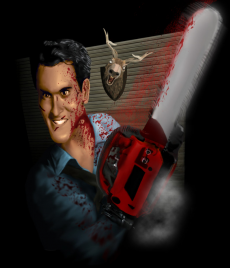
Email: reecejordan98@hotmail.co.uk
Total Article : 168
About Me:18-year-old sixth form student, studying English Literature, History and Government and Politics. My articles will broadly cover topics from the current affairs of politics to reviews of books and albums, as well as adding my own creative pieces, whether it be short fiction or general opinion.

It is argued that that what differentiates humans from animals is their adept ability to communicate, and, as a result, create moral and social conventions. However, within both ‘Chainsaw Versus the Pampas Grass’ and ‘The Gun’, it is not this periphery of our nature that is explored, but rather the deeper insatiable carnal desire that lurks underneath, which seems to subvert these niceties, and thus blur the line between human and animal. The poems resonate the notion that this animalism derives from a shift, or a wanting for a shift, in a power dynamic, and how the metamorphosis that occurs as a result is not subtle but, rather, all encompassing.
In ‘Chainsaw’, Armitage uses the ferocious image of a chainsaw as a metaphor for humans’ visceral animalism. He personalises it, describing it as having a “bloody desire” and a “sweet tooth”, and this idea of animalism having a craving builds a disconcerting image of foreboding relentlessness in its ambition to satiate itself. This personalisation also reveals that the chainsaw serves as a symbol for the voice’s own craving – the chainsaw having a “bloody desire” is really a transferred epithet of the voice’s own. A similar idea is covertly expressed in ‘The Gun’. Feaver presents this animalism as something latent, something always present but, in this case, needs just a prompting (e.g. having a gun in the house) for it to surface. The subsequent evolution of this dormant longing is conveyed in the escalation of the speaker’s involvement in the consequential killings with the gun: from originally treating it cautiously and as something ominous (“casting a grey shadow on the green-checked cloth”) to then her hands “reeking of gun oil and entrails” from persistent participation. This emphasises the idea, like ‘Chainsaw’, that the human animalism has a hunger that must be satisfied, and that this comes about in an unforeseen way reveals a disturbing aspect of human nature.
Both poems also explore the idea that this animalism is relative to the want for a shift in a power dynamic. Armitage’s title ‘Chainsaw versus the Pampas Grass” creates this idea of the two in battle, vying for significance. However, we begin to realise that this, in fact, is a vendetta against the pampas grass, or, rather, what the pampas grass symbolises – perhaps a female whom the voice has been attracted to (inferred from the feminine connotations of “hair and jewellery”), or the vain (“soaking up the sun”). Thus, it could be said that this animalism and barbarity shown in the chainsaw, is awakened out of the yearning for ascendency in power. Feaver also explores this idea perhaps more prominently in that a gun’s primary role is to harm - to inflict damage or kill. Human civility deters us from these things usually, but as a gun “changes a house” (a person), we see this conscious moral standing subside and be replaced by a deeper disturbing nature. This Freudian element of the poem stems from that the killing of another being creates a shift in a power dynamic – it sadistically becomes pleasure (“there’s a spring in your step”). Thus, the poems also reveal that human nature has a vice in its yearning for power.
The poems differ in how they explore the consequences of such metamorphoses. In ‘Chainsaw’ the animalism does not win the ultimate war. We are told that the pampas grass “sits on a new throne”, revealing that it is in fact the victor. If we are to recognise the pampas grass as a symbol of human civility and passivity then we may interpret the poem as conveying this idea that perhaps this animalism, and its consequences, is forever weaker than moral judgment. Or, perhaps, that within each human lies this innate carnal desire that is sporadically let loose, as is the chainsaw, but soon overcome by morality and conscious thought, which maintains and regrows its fundaments despite an interruption by animalism. However, in ‘The Gun’, it depicts human lives as something that needs these desires in order to charge it with excitement. Perhaps, in adversary with ‘Chainsaw’, that animalism is more important, and more powerful, than moral judgement – that we are to live in, or indulge in, an animalistic manner to truly enjoy life.
Thus both poems reveal the duplicity of human nature – that though we live civilly, but lying beneath us lies a latent craving – animalistic desire against conscious thought and restrain. The poems draw up a debate about the significance of the latter, and whether it overshadows the former – a disturbing insight into human nature.
Image Credits: DevianArt

0 Comment:
Be the first one to comment on this article.